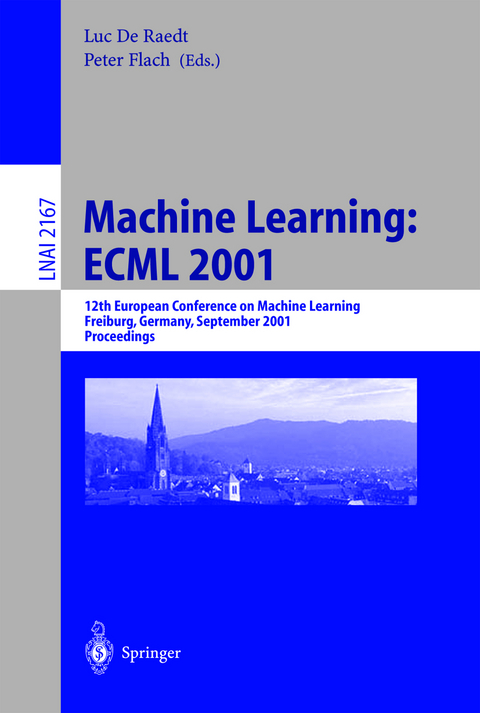
Machine Learning: ECML 2001
Springer Berlin (Verlag)
978-3-540-42536-6 (ISBN)
The 50 revised full papers presented together with four invited contributions were carefully reviewed and selected from a total of 140 submissions. Among the topics covered are classifier systems, naive-Bayes classification, rule learning, decision tree-based classification, Web mining, equation discovery, inductive logic programming, text categorization, agent learning, backpropagation, reinforcement learning, sequence prediction, sequential decisions, classification learning, sampling, and semi-supervised learning.
Regular Papers.- An Axiomatic Approach to Feature Term Generalization.- Lazy Induction of Descriptions for Relational Case-Based Learning.- Estimating the Predictive Accuracy of a Classifier.- Improving the Robustness and Encoding Complexity of Behavioural Clones.- A Framework for Learning Rules from Multiple Instance Data.- Wrapping Web Information Providers by Transducer Induction.- Learning While Exploring: Bridging the Gaps in the Eligibility Traces.- A Reinforcement Learning Algorithm Applied to Simplified Two-Player Texas Hold'em Poker.- Speeding Up Relational Reinforcement Learning through the Use of an Incremental First Order Decision Tree Learner.- Analysis of the Performance of AdaBoost.M2 for the Simulated Digit-Recognition-Example.- Iterative Double Clustering for Unsupervised and Semi-supervised Learning.- On the Practice of Branching Program Boosting.- A Simple Approach to Ordinal Classification.- Fitness Distance Correlation of Neural Network Error Surfaces: A Scalable,Continuous Optimization Problem.- Extraction of Recurrent Patterns from Stratified Ordered Trees.- Understanding Probabilistic Classifiers.- Efficiently Determining the Starting Sample Size for Progressive Sampling.- Using Subclasses to Improve Classification Learning.- Learning What People (Don't) Want.- Towards a Universal Theory of Artificial Intelligence Based on Algorithmic Probability and Sequential Decisions.- Convergence and Error Bounds for Universal Prediction of Nonbinary Sequences.- Consensus Decision Trees: Using Consensus Hierarchical Clustering for Data Relabelling and Reduction.- Learning of Variability for Invariant Statistical Pattern Recognition.- The Evaluation of Predictive Learners: Some Theoretical and Empirical Results.- An Evolutionary Algorithm for Cost-Sensitive Decision Rule Learning.- A Mixture Approach to Novelty Detection Using Training Data with Outliers.- Applying the Bayesian Evidence Framework to ?-Support Vector Regression.- DQL: A New Updating Strategy for Reinforcement Learning Based on Q-Learning.- A Language-Based Similarity Measure.- Backpropagation in Decision Trees for Regression.- Comparing the Bayes and Typicalness Frameworks.- Symbolic Discriminant Analysis for Mining Gene Expression Patterns.- Social Agents Playing a Periodical Policy.- Learning When to Collaborate among Learning Agents.- Building Committees by Clustering Models Based on Pairwise Similarity Values.- Second Order Features for Maximising Text Classification Performance.- Importance Sampling Techniques in Neural Detector Training.- Induction of Qualitative Trees.- Text Categorization Using Transductive Boosting.- Using Multiple Clause Constructors in Inductive Logic Programming for Semantic Parsing.- Using Domain Knowledge on Population Dynamics Modeling for Equation Discovery.- Mining the Web for Synonyms: PMI-IR versus LSA on TOEFL.- A Unified Framework for Evaluation Metrics in Classification Using Decision Trees.- Improving Term Extraction by System Combination Using Boosting.- Classification on Data with Biased Class Distribution.- Discovering Admissible Simultaneous Equation Models from Observed Data.- Discovering Strong Principles of Expressive Music Performance with the PLCG Rule Learning Strategy.- Proportional k-Interval Discretization for Naive-Bayes Classifiers.- Using Diversity in Preparing Ensembles of Classifiers Based on Different Feature Subsets to Minimize Generalization Error.- Geometric Properties of Naive Bayes in Nominal Domains.- Invited Papers.- Support Vectors for Reinforcement Learning.- Combining Discrete Algorithmic and Probabilistic Approaches in Data Mining.- Statistification or Mystification? The Need for Statistical Thought in Visual Data Mining.- The Musical Expression Project: A Challenge for Machine Learning and Knowledge Discovery.- Scalability, Search, and Sampling: From Smart Algorithms to Active Discovery.
| Erscheint lt. Verlag | 23.8.2001 |
|---|---|
| Reihe/Serie | Lecture Notes in Artificial Intelligence | Lecture Notes in Computer Science |
| Zusatzinfo | XVII, 620 p. |
| Verlagsort | Berlin |
| Sprache | englisch |
| Maße | 155 x 233 mm |
| Gewicht | 889 g |
| Themenwelt | Informatik ► Theorie / Studium ► Algorithmen |
| Informatik ► Theorie / Studium ► Künstliche Intelligenz / Robotik | |
| Schlagworte | Algorithm analysis and problem complexity • Algorithmic Learning • Case-Based Learning • Case-Based Reasoning • classification • Classifiers • Decision Tree Algorithms • Hardcover, Softcover / Informatik, EDV/Informatik • HC/Informatik, EDV/Informatik • Inductive Inference • learning • Logic • machine learning • programming • Q-Learning • Reinforcement Learning • Relational Data Mining • Rule-Based Systems • supervised learning • Text • Web mining |
| ISBN-10 | 3-540-42536-5 / 3540425365 |
| ISBN-13 | 978-3-540-42536-6 / 9783540425366 |
| Zustand | Neuware |
| Haben Sie eine Frage zum Produkt? |
aus dem Bereich


